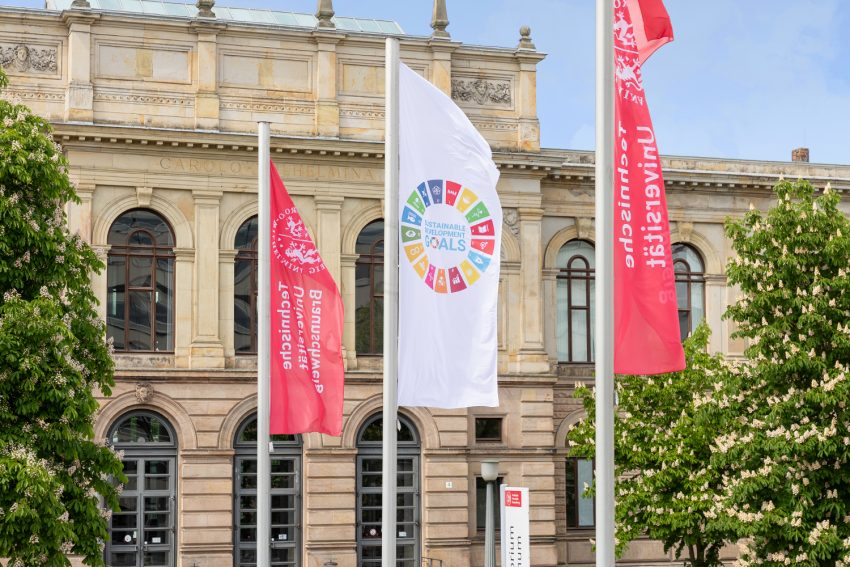Excellent sustainability TU Braunschweig performs outstandingly in THE "Impact Rankings"
According to the “Impact Rankings” published by the British education magazine Times Higher Education (THE), Technical University of Braunschweig is among the top three universities in Germany for three of the 17 sustainability goals. This puts it in first place among universities in Niedersachsen. The ranking assesses how universities around the world are contributing to the United Nations’ 17 Sustainable Development Goals (SDGs).

By raising the flag of the UN Sustainable Development Goals on the university square, TU Braunschweig is publicly committing itself to sustainable development on its path to becoming a climate-neutral university. Photo credit: Kristina Rottig/TU Braunschweig
The SDGs are political objectives of the United Nations (UN) intended to ensure sustainable economic, social and ecological development worldwide. In the 2025 Times Higher Education Impact Rankings, 2,526 universities from 130 countries or territories were evaluated on their progress towards achieving these goals.
“The UN’s 17 sustainability goals reflect the key social challenges of our time. The results of the THE Impact Rankings show that TU Braunschweig has not only anchored the pursuit of these goals in its sustainability strategy, but is also making a significant contribution in the areas of teaching and research, transfer, administration and governance. Together with our partners, we take responsibility for sustainable thinking and action, and I am delighted that these efforts are now also being recognised internationally,” says Manfred Krafczyk, Vice President for Digitalisation and Sustainability, summarising TU Braunschweig’s performance in the ranking.
TU Braunschweig ranked first in Germany for climate action and life on land
In terms of the climate action (SDG 13) and life on land (SDG 15) goals, TU Braunschweig is tied for first place with other German universities and is among the top 200 universities worldwide.
A total of 1,089 universities from 105 countries were evaluated on their contribution to climate protection as part of the sustainability goal. These universities are recognised for their efforts to reduce greenhouse gas emissions, adapt to climate change, and promote climate resilience through research and campus policies. They influence national and international climate policies.
A total of 854 universities from 96 countries were assessed in relation to protecting life on land. The top institutions are dedicated to combatting biodiversity loss, promoting sustainable forest management, and restoring degraded soils. Through research, education and conservation measures, they contribute to the preservation of terrestrial ecosystems.
Among the 200 best universities worldwide for the goal Affordable and clean energy
Times Higher Education ranked 1,181 universities from 105 countries based on their efforts to achieve this goal (SDG 7). TU Braunschweig came second in Germany, behind the University of Erlangen-Nuremberg. Once again, TU Braunschweig is among the top 200 universities worldwide for research and implementation of sustainable energy services, energy efficiency, and infrastructure investments. Innovative research in this area and its practical application help to diversify the energy mix and provide universal access to clean energy sources.
TU Braunschweig is committed to its responsibility for sustainable development
TU Braunschweig’s sustainability strategy integrates ecological, social and economic dimensions, with a particular focus on climate protection. The Sustainable Development Goals (SDGs) serve as a working basis for the Green Office, which focuses on education for sustainable development (ESD) and the ambassador programme. TU Braunschweig has integrated sustainability into both its strategy and everyday life, as demonstrated by the presentation of the TUmorrow Awards, the designation as a Fairtrade University and the extensive ‘Sustainability’ course catalogue. Concrete measures include energy-efficient new buildings, renovations and the expansion of photovoltaics. The university combines digitalisation and sustainability to enable efficient building and energy management. TU Braunschweig actively contributes to climate protection in its research, for example through projects on climate-friendly mobility and sustainable construction. Cooperation with external partners, such as in the Niedersachsen University Sustainability Network (HochNiNa) and the International Sustainable Campus Network (ISCN), as well as membership in the Braunschweig Climate Protection Network, underscore the TU Braunschweig’s community spirit when it comes to sustainable development.
